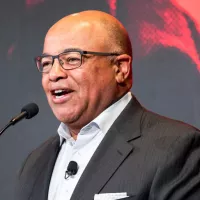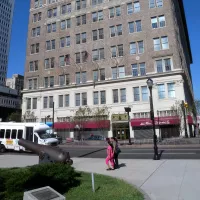Radio City Music Hall, located in Midtown Manhattan's Rockefeller Center, is a renowned entertainment venue nicknamed "The Showplace of the Nation." Designed in the Art Deco style by Edward Durell Stone and Donald Deskey, it serves as the headquarters for the Rockettes dance troupe. As a landmark, it is a prominent cultural and architectural fixture in New York City.
December 1929: Opera House Project Canceled
In December 1929, the planned opera house for the Metropolitan Opera was canceled due to financial and other issues, leading Rockefeller to develop Rockefeller Center as a mass media complex instead.
1930: Samuel Roxy Rothafel Joins Advisory Board
In 1930, Samuel "Roxy" Rothafel, a successful theater operator, joined the Rockefeller Center's advisory board and proposed building two theaters: the International Music Hall and the RKO Roxy movie theater.
December 1931: Construction of Radio City Music Hall Begins
In December 1931, construction began on Radio City Music Hall, marking a significant step in the development of the theater.
August 1932: Radio City Music Hall Topped Out
In August 1932, Radio City Music Hall's construction reached its highest point, "topping out" and setting records for the amount of materials used.
November 1932: Roxyettes Move to Radio City
In November 1932, the Roxyettes, a precision dance troupe later known as the Rockettes, announced their move from the Roxy Theatre to Radio City Music Hall.
December 27, 1932: Radio City Music Hall Opens
On December 27, 1932, Radio City Music Hall opened as part of Rockefeller Center. The Music Hall had 5,960 seats and was the larger of two venues built for Rockefeller Center's "Radio City" section.
1932: Radio City Music Hall of the Air Broadcasts Begin
In 1932, Radio City Music Hall started weekly broadcasts of live concerts on the NBC Blue Network radio program Radio City Music Hall of the Air, under conductor Ernö Rapée.
1932: Varied Designs in Restrooms and Lounges
In 1932, a New York Times article described the varied designs in the men's smoking rooms, women's lounges, and restrooms on each of the three mezzanine levels, noting that these spaces were meant to be dramatic since they were used for only a few hours.
1932: Start of Rockefeller Center Construction
In 1932, the construction of Rockefeller Center began on land leased by John D. Rockefeller Jr. from Columbia University.
1932: Radio City Music Hall Opening
Radio City Music Hall originally opened in 1932.
January 11, 1933: Radio City Shifts to Showing Films
On January 11, 1933, Radio City Music Hall transitioned to showing feature films accompanied by stage shows, starting with Frank Capra's "The Bitter Tea of General Yen", after initial live shows were poorly received. The transition followed a net operating loss of $180,000.
1933: Radio City Becomes Showcase for RKO-Radio Films
In 1933, Radio City Music Hall became the premiere showcase for films from the RKO-Radio studio, with "Topaze" being the first RKO film to play there.
1933: Radio City Christmas Spectacular Debut
In 1933, the Radio City Christmas Spectacular, an annual Christmas stage musical featuring the Rockettes, debuted as a New York Christmas tradition.
1933: Holy Hour Services Begin
Starting in 1933, Radio City Music Hall began hosting holy hour services for Catholics, Protestants, and Jews, alongside its movie screenings.
May 1934: Radio City Experiments with Operatic Performances
In May 1934, Radio City Music Hall started experimenting with operatic performances, which became so popular that more opera shows were produced to be performed four times a day.
1935: "Becky Sharp" Screened
In 1935, "Becky Sharp", the first feature film to use three-strip Technicolor production, was screened at Radio City Music Hall.
1936: Film Version of "Show Boat" Screened
In 1936, a film version of the musical "Show Boat" was screened at Radio City Music Hall.
January 1937: 25 Million Visitors in Four Years
By January 1937, Radio City Music Hall had welcomed over 25 million visitors in the previous four years, with a total admission revenue of $17.5 million.
1937: "Radio City" Name Becomes Synonymous with Radio City Music Hall
By 1937, the name "Radio City" had become shorthand for Radio City Music Hall, as it was the only part of the Rockefeller Center complex that retained the name.
October 8, 1939: World Premiere of Christopher Columbus
On October 8, 1939, Radio City's symphony orchestra performed the world premiere of Eugene Zador's opera Christopher Columbus for national radio broadcast on Radio City Music Hall of the Air.
1940: Easter Worship Services Begin
In 1940, Radio City Music Hall began hosting Easter worship services, adding to its diverse range of events.
1940: Completion of Rockefeller Center Construction
In 1940, the construction of Rockefeller Center was completed, transforming the area into a mass media complex.
1941: World War II Fundraiser Held
In 1941, Radio City Music Hall hosted a large fundraiser for World War II efforts, described as "the most elaborate benefit performance ever held in New York."
January 1942: G.S. Eysell Becomes Managing Director
In January 1942, G. S. Eysell took over as the managing director of Radio City Music Hall after the death of William G. Van Schmus.
1942: End of Radio City Music Hall of the Air Broadcasts
In 1942, the weekly broadcasts of live concerts from Radio City on the NBC Blue Network radio program Radio City Music Hall of the Air, under conductor Ernö Rapée, ended.
1945: Ernö Rapée Dies
In 1945, Ernö Rapée, who had been the head of Radio City Music Hall's orchestra since its opening, passed away.
1947: Alexander Smallens Becomes Musical Director
In 1947, Alexander Smallens became the musical director of Radio City Music Hall, succeeding the previous director.
1947: "The Late George Apley" Film Showing
In 1947, Radio City Music Hall hosted films such as "The Late George Apley".
1953: Sound System Upgraded; Benefit Parties for Big Brothers Inc.
In 1953, Radio City Music Hall upgraded its sound system to show 3D films without intermission and hosted benefit parties for Big Brothers Inc.
1958: In-House Male Chorus Disbanded
In 1958, Radio City Music Hall disbanded its in-house male chorus and started hiring choral acts from around the world.
1959: Benefit Parties for Big Brothers Inc.
In 1959, Radio City Music Hall continued hosting benefit parties for Big Brothers Inc.
1961: "Breakfast at Tiffany's" Premieres at Radio City
In 1961, the movie "Breakfast at Tiffany's" premiered at Radio City Music Hall.
1962: "To Kill a Mockingbird" Premieres at Radio City
In 1962, "To Kill a Mockingbird" premiered at Radio City Music Hall, adding to its list of prestigious film premieres.
1962: 30th Anniversary and Close Down Announcement
In 1962, Radio City Music Hall celebrated its 30th anniversary with nearly 200 million patrons. Despite the success, officials intended to close the venue down.
November 26, 1963: First Full-Day Closure
On November 26, 1963, Radio City Music Hall experienced its first full-day closure in its history following the assassination of John F. Kennedy.
1964: Estimated 5.7 Million Annual Visitors
In 1964, Radio City Music Hall had an estimated 5.7 million annual visitors, who paid ticket prices between 99 cents and $2.75.
1964: "Mary Poppins" Premieres at Radio City
In 1964, the movie "Mary Poppins" premiered at Radio City Music Hall, marking another significant premiere for the theater.
March 8, 1965: Reopening After Cleaning
On March 8, 1965, Radio City Music Hall reopened after a five-day full cleaning, showcasing the film "Dear Heart".
March 1965: First Full Cleaning
In March 1965, Radio City Music Hall underwent its first full cleaning in its history, which took five days and included changing curtains and painting the ceiling.
1965: NFL Draft Hosted in New York City
In 1965, The NFL Draft had been hosted at other locations in New York City.
1965: Curtain Replacement
The main curtain was replaced in 1965, prior to being replaced again in 1987.
1966: Russell V. Downing retires
In 1966, Russell V. Downing retired as Radio City's president and was replaced by James F. Gould.
January 1967: 200 Millionth Visitor
In January 1967, Radio City Music Hall celebrated its 200 millionth visitor, a little less than two years after its renovation.
1967: "The Jungle Book" Premieres at Radio City
In 1967, the film "The Jungle Book" premiered at Radio City Music Hall, continuing the theater's tradition of hosting major movie premieres.
1968: High Attendance Figures
In 1968, Radio City Music Hall reported 5 million visitors.
1969: Decline in Tourism Affects Attendance
By 1969, a decline in tourism to New York City began to affect Radio City Music Hall's attendance.
1971: Change of Chief Organist
In 1971, Richard Leibert retired as Radio City's chief organist, a position he had held since the hall's opening in 1932. Raymond Bohr succeeded him in the role.
1972: Staff Cuts and Temporary Closure
In 1972, Radio City Music Hall fired performers' unions and six Rockettes and was temporarily closed after officials failed to reach an employment agreement with musicians, marking the first closure due to staffing issues.
1973: James F. Gould retires
In 1973, James F. Gould retired as president of Radio City, having expanded programming to include rock concerts and wrestling matches.
1973: Labor Dispute Leads to Policy Changes
In 1973, a labor dispute forced Radio City to reduce its policy of mixed films and stage shows. A shutdown was avoided when the musicians' union agreed to a three-year contract where musicians were paid for 38 weeks a year instead of 52. This allowed managers to schedule live entertainment during the remaining 14 weeks, including rock concerts, pop festivals, and boxing telecasts.
1975: Financial Losses and Closure Rumors
By early 1975, Radio City continued to lose $600,000 a year, costing $55,000 a week to rent and $20,000 for salaries. Despite 3.5 million annual visitors, rumors of closure persisted, although managers denied them. Architectural critic Ada Louise Huxtable noted in 1975 that Radio City was still more popular than the Metropolitan Museum of Art, the American Museum of Natural History, and the Bronx Zoo.
1975: Mural Donation
In 1975, Stuart Davis's mural Men Without Women, a mural of masculine stereotypical pastimes in the basement-level men's lounge, was donated to the Museum of Modern Art.
1977: Annual Attendance Reaches All-Time Low
In 1977, Radio City's annual attendance hit a low of 1.5 million, a 70% decrease from 5 million in 1968. The theater lost $2.3 million during the year. Factors included patrons moving to the suburbs, fear of crime in New York City, and a lack of family-friendly movies.
January 1978: Radio City Faces Imminent Closure
By January 1978, Radio City was in debt and could not remain open after April. President Alton Marshall announced that Radio City Music Hall would close on April 12 due to a projected $3.5 million loss. Proposals to convert the theater into other venues were considered, but managers were focused on real estate development potential.
March 1978: Landmark Preservation Efforts and Public Hearings
In March 1978, the New York City Landmarks Preservation Commission (LPC) held public hearings regarding the theater's landmark status. Rosemary Novellino and Mary Anne Krupsak led efforts to save Radio City, including protests and calls to Rockefeller Center's manager. Over 100,000 people supported the designation, and on March 28, the LPC designated the interior as a city landmark.
May 12, 1978: Radio City Added to the National Register of Historic Places
On May 12, 1978, Radio City Music Hall was added to the National Register of Historic Places.
May 1978: Radio City Designated a New York City Landmark
In May 1978, Radio City Music Hall was designated a New York City Landmark, leading to its restoration and continued operation.
September 13, 1978: Losses Continue Under UDC Operation
From April 13 to September 13, 1978, when the UDC operated the theater, losses totaled $1.2 million.
February 1979: Draft Study Recommends Office Building Above Theater
A draft study published in February 1979 recommended plans for an office building above Radio City Music Hall. Davis Brody Associates designed a 31-story office and hotel building to be cantilevered over the theater.
April 25, 1979: End of Film-Plus-Stage-Spectacle Format
On April 25, 1979, the film-plus-stage-spectacle format ended at Radio City Music Hall with the screening of "The Promise", after which the theater closed for renovation.
May 31, 1979: Radio City Reopens After Renovation
Radio City Music Hall reopened on May 31, 1979, after a renovation, with a special ceremony to celebrate the occasion.
January 1980: Radio City Hosts New Shows
By January 1980, Radio City was hosting shows such as the stage adaptation of "Snow White and the Seven Dwarfs" and the "Rockettes Spectacular".
October 1980: The Grateful Dead Performances
In October 1980, The Grateful Dead played eight shows over nine days at Radio City Music Hall, culminating on Halloween.
1980: First Grammy Awards at Radio City Music Hall
In 1980, Radio City Music Hall hosted its first Grammy Awards, the annual ceremony presented by the Recording Academy for music.
1983: Shift to Music Concerts and Film Production
In 1983, Radio City Music Hall shifted its focus to music concerts and participating in film and TV show production. Radio City Music Hall Productions started creating or co-creating films and Broadway shows such as "Legs" and "Brighton Beach Memoirs".
1983: LPC Considers Landmark Status for Rockefeller Center
In 1983, the LPC held hearings to determine how much of Rockefeller Center, including the exterior of Radio City Music Hall, should be protected as a landmark. The Rockefeller family recommended protecting only the block between 49th and 50th Streets.
1984: MTV Video Music Awards at Radio City Music Hall
In 1984, the MTV Video Music Awards began being hosted at Radio City Music Hall.
April 23, 1985: Landmark Status Granted to Rockefeller Center Exteriors
On April 23, 1985, the LPC granted landmark status to the exteriors of all original Rockefeller Center buildings, including the exterior of Radio City Music Hall.
1985: Radio City Records Net Gain
In 1985, Radio City recorded a net gain of $2.5 million, its first profit in three decades. This was attributed to music concerts and hosting televised events, including the Grammy Awards, the Tony Awards, the Daytime Emmy Awards, the MTV Video Music Awards, and the NFL Draft.
January 1987: New Golden Curtain Installed
In January 1987, a new golden curtain was installed at the main stage, the third since Radio City's opening in 1932. Due to its historic status, the curtain had to match the style, texture, and color of previous curtains.
1987: Rockefeller Center designated a National Historic Landmark
In 1987, Rockefeller Center's original buildings also became a National Historic Landmark, solidifying its place in history.
November 1988: Wheel of Fortune Road Trip
For two weeks in November 1988, Radio City Music Hall hosted Wheel of Fortune, marking the show's first road trip. Saturday Night Live announcer Don Pardo announced during the two weeks.
1988: Late Night with David Letterman Sixth Anniversary Special
In 1988, David Letterman hosted the Late Night with David Letterman Sixth Anniversary Special at Radio City Music Hall.
1992: Late Night with David Letterman Tenth Anniversary Special
In 1992, David Letterman hosted the Late Night with David Letterman Tenth Anniversary Special at Radio City Music Hall.
1994: "The Lion King" Premieres at Radio City
In 1994, "The Lion King" premiered at Radio City Music Hall, adding to its legacy of hosting major film premieres.
March 1996: Riverdance North American Debut
In March 1996, the Irish dance show Riverdance made its North American debut at Radio City Music Hall, breaking box-office records.
1997: Lease to Madison Square Garden Company
In 1997, Radio City was leased to the Madison Square Garden Company, providing funding for the Rockettes and the Christmas Spectacular at Radio City. Cablevision gained the right to renovate and manage the theater.
1997: Tony Awards at Radio City Music Hall
In 1997, the Tony Awards, the annual ceremony for Broadway theatre, began being presented at Radio City Music Hall.
February 1998: Sesame Street Elmopalooza Music Special
In February 1998, Radio City Music Hall was the setting for the Sesame Street music special Elmopalooza, featuring Jon Stewart, David Alan Grier, and the cast of Sesame Street and the Muppets.
1998: Last Grammy Awards at Radio City Music Hall
In 1998, Radio City Music Hall hosted its last Grammy Awards.
February 16, 1999: Radio City Closes for Renovation
Radio City closed on February 16, 1999, for a comprehensive renovation to clean, modernize, and replace components, including curtains, seats, carpets, doorknobs, and light fixtures.
October 4, 1999: Radio City Reopens After Renovation
Radio City reopened on October 4, 1999, with a gala concert, following an extensive $70 million renovation.
1999: Theater Renovation
In 1999, Radio City Music Hall underwent extensive renovations to improve the facilities.
1999: Carpet Design Replacement
In 1999, Ruth Reeves' carpet design, containing musical motifs, was replaced during renovations.
1999: Mural Loan
In 1999, the Museum of Modern Art loaned back to Radio City Music Hall, Stuart Davis's mural Men Without Women, a mural of masculine stereotypical pastimes in the basement-level men's lounge.
January 15, 2000: First Sports Event: Roy Jones Jr. Boxing Match
On January 15, 2000, the first sports event at Radio City Music Hall took place, a boxing card headlined by Roy Jones Jr. and David Telesco.
October 2001: Come Together: A Night for John Lennon's Words and Music Simulcast
In October 2001, the concert Come Together: A Night for John Lennon's Words and Music was simulcast live from Radio City Music Hall on The WB and TNT, after being delayed following the September 11 attacks.
2001: Great Stage Designated Historic Mechanical Engineering Landmark
In 2001, the Great Stage at Radio City Music Hall was designated as a Historic Mechanical Engineering Landmark, recognizing its innovative design and engineering.
May 2002: Jeopardy! 4000th Episode and Million Dollar Masters Tournament
In May 2002, Radio City Music Hall hosted Jeopardy!'s four-thousandth episode, along with the show's Million Dollar Masters invitational tournament.
July 2004: New York Liberty Home Games at Radio City
In July 2004, the WNBA's New York Liberty played six home games at Radio City Music Hall while Madison Square Garden prepared to host the 2004 Republican National Convention, with the first game against the Detroit Shock taking place in front of 5,945 fans.
November 2006: Celebrity Jeopardy! Event
In November 2006, Radio City Music Hall was used for a 2-week Celebrity Jeopardy! event.
2006: NFL Draft at Radio City Music Hall
In 2006, Radio City Music Hall began hosting the NFL Draft.
November 2007: Jeopardy! 25th Anniversary
In November 2007, Radio City Music Hall hosted Jeopardy! again for the nighttime show's 25th anniversary.
April 13, 2013: Nonito Donaire vs. Guillermo Rigondeaux Boxing Card
On April 13, 2013, Radio City Music Hall hosted a boxing card featuring Nonito Donaire facing Guillermo Rigondeaux.
2013: America's Got Talent Live Shows Move to Radio City
In 2013, it was announced that America's Got Talent would hold its live shows from the Radio City Music Hall starting with its eighth season that summer, to take advantage of New York tax credits.
2014: Last NFL Draft at Radio City Music Hall
In 2014, Radio City Music Hall hosted its last NFL Draft, before the National Football League began hosting the draft in other cities.
November 17, 2015: Adele Concert Recording
On November 17, 2015, Adele performed a one-night-only concert at Radio City Music Hall, which was recorded.
2016: America's Got Talent Moves to the Dolby Theatre
In 2016, after Howard Stern's departure, America's Got Talent moved its live shows from Radio City Music Hall to the Dolby Theatre in Los Angeles.
2018: MTV Video Music Awards at Radio City Music Hall
In 2018, the MTV Video Music Awards were hosted at Radio City Music Hall.
2019: Tony Awards at Radio City Music Hall
In 2019, the Tony Awards, the annual ceremony for Broadway theatre, presented at Radio City Music Hall.
2020: Initial Decision to Remain Open Amid COVID-19 Pandemic
In March 2020, Radio City Music Hall initially decided to remain open despite a ban on gatherings of 500 or more due to the COVID-19 pandemic. However, the venue decided to close indefinitely after March 13.
March 2021: Plans Approved for Rooftop Terrace and Pedestrian Bridge
In March 2021, the LPC approved plans submitted by Tishman Speyer to construct a 24,000-square-foot rooftop terrace and a pedestrian bridge to 1270 Avenue of the Americas.
September 2021: Radio Park Opens on Rooftop Terrace
In September 2021, Radio Park, a rooftop terrace designed by HMWhite, opened. The park includes birch trees, bleachers, and pathways, and is only usable by tenants of 1270 Avenue of the Americas and their guests.
2021: Plans Announced to Reopen with Limited Capacity and then Without Restrictions
In early 2021, it was announced that Radio City would open with limited capacity in April. This was followed by the announcement from New York Governor Andrew Cuomo to reopen in June, without capacity limits or mask restrictions, but with mandatory COVID-19 vaccination for patrons.
2022: Tony Awards at Radio City Music Hall
In 2022, the Tony Awards, the annual ceremony for Broadway theatre, presented at Radio City Music Hall.
2023: Ticket price conversion
In 1964, ticket prices were between 99 cents and $2.75, the equivalent of between $7 and $21 in 2023.
2025: Tony Awards at Radio City Music Hall
In 2025, the Tony Awards, the annual ceremony for Broadway theatre, is planned to be presented at Radio City Music Hall.
Mentioned in this timeline

Adele Laurie Blue Adkins is a highly acclaimed English singer-songwriter...

John F Kennedy JFK was the th U S President...

Howard Stern is a renowned American radio personality recognized for...
Saturday Night Live SNL is a late-night live sketch comedy...

The lion Panthera leo is a large cat species native...

John Lennon was a highly influential English singer-songwriter musician and...
Trending

1 hour ago Mike Tirico's Inspiring Olympic Sign-Off: A Look at His Legacy in Sports Broadcasting.

1 hour ago Benny Blanco's Dirty Feet Video Sparks Internet Outrage and Divorce Suggestions for Selena Gomez.

1 hour ago Rock & Roll Hall of Fame Announces 2026 Nominees: Mariah, P!NK, Wu-Tang Clan Lead

1 hour ago Matthew Lillard Responds to Quentin Tarantino's Criticism, Appreciates Hollywood's Support After Feeling 'Punched'

2 hours ago New Jersey Schools impacted as a major blizzard brings record snowfall.
2 hours ago Rugby Property Assets acquires Cavendish Walk Shopping Centre in Merseyside for £1.5m.
Popular

Jesse Jackson is an American civil rights activist politician and...

Susan Rice is an American diplomat and public official prominent...

Barack Obama the th U S President - was the...

Michael Joseph Jackson the King of Pop was a highly...

XXXTentacion born Jahseh Dwayne Ricardo Onfroy was a controversial yet...

Bernie Sanders is a prominent American politician currently serving as...